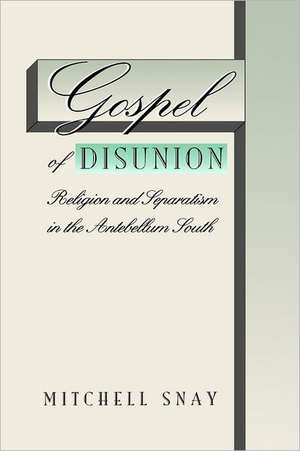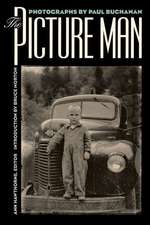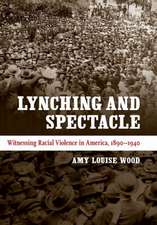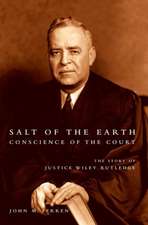Gospel of Disunion
Autor Mitchell Snayen Limba Engleză Paperback – 28 sep 1997
| Toate formatele și edițiile | Preț | Express |
|---|---|---|
| Paperback (1) | 339.95 lei 6-8 săpt. | |
| University of North Carolina Press – 28 sep 1997 | 339.95 lei 6-8 săpt. | |
| Hardback (1) | 459.73 lei 6-8 săpt. | |
| Cambridge University Press – 28 oct 1993 | 459.73 lei 6-8 săpt. |
Preț: 339.95 lei
Nou
Puncte Express: 510
Preț estimativ în valută:
65.05€ • 67.92$ • 53.72£
65.05€ • 67.92$ • 53.72£
Carte tipărită la comandă
Livrare economică 15-29 aprilie
Preluare comenzi: 021 569.72.76
Specificații
ISBN-13: 9780807846872
ISBN-10: 0807846872
Pagini: 280
Dimensiuni: 166 x 231 x 21 mm
Greutate: 0.45 kg
Ediția:Revised
Editura: University of North Carolina Press
ISBN-10: 0807846872
Pagini: 280
Dimensiuni: 166 x 231 x 21 mm
Greutate: 0.45 kg
Ediția:Revised
Editura: University of North Carolina Press
Notă biografică
Cuprins
Introduction. Religion and the search for Southern distinctiveness; Part I. Religion and Sectional Politics: 1. The abolitionist crisis of 1835: the issues defined; Part II. Religion and Slavery: 2. Slavery defended: the morality of slavery and the infidelity of abolitionism; 3. Slavery sanctified: the slaveholding ethic and the religious mission to the slaves; Part III. Religion and Separatism: 4. Harbingers of disunion: the denominational schisms, 5. The religious logic of secession; 6. Religion and the formation of a Southern nationalism and the coming of the Civil War.
Recenzii
"...a significant contribution to the comprehension of factors that led to the Civil War... The strength of Snay's work lies in his tremendous research, including both northern and southern newpapers, periodicals, and many denominational records." West Virginia History
"Mitchell Snay's book exemplifies the interpretative gain offered by a close reading of the religious sources related to slavery and the secession controversy in the Old South....Snay utilizes a broad range of primary sources to portray and analyze the religious dimension of this momentuous rupture in the political landscape of the nation, and he does so with analytical precision....Snay's convincing interpretation is also written in clear, uncluttered prose, refreshingly free of jargon and the nearly impenetrable clutter of modern literary criticism. The result is a work of interest and importance to most southern historians, not just to specialists in religion." John B. Boles, Georgia Historical Quarterly
"...an impressive exposition of the subtle ways in which southern churchmen advanced a sense of southern self-consciousness, handled the delicate, constitutional problem of church-state separation, departed from disapproving northern colleagues in the national denominations, and sharpened Biblical and natural-law rhetorical defenses of slavery....Snay's extensive research in newspapers, minutes of church assemblies, and sermon collections is most striking, giving an unusual depth to his analysis. Gospel of Disunion brings together all the recent scholarship in a most accessible and congenial synthesis. More important, the author has invested his own intelligence and interpretive skill to give the study a vital spirit of its own." Bertram Wyatt-Brown, Reviews in American History
"Mitchell Snay is the first to focus on the relationship between religious ideology and the development of southern separatism...[his] contribution is significant." Curtis D. Johnson, The Journal of American History
"Mitchell Snay has crafted an insightful and informative study of the critical role that Southern religion played in formatting a distinctive sectional identity during the three decades before the Civil War....Those seeking as complete an understanding as possible of those forces that drove a nation into bloody civil war will want to add this book to their reading list. The writing is clear and concise, and it is enlivened with numerous quotes and examples illustrating the author's points. Well written, this book may appeal to the casual reader, but will certainly be of great interest to serious students of the antebellum era." Paul D. Haynie, The Historian
"Much of the book recapitulates earlier arguments by Donald Mathews, C. C. Goen, John McCardell, and Drew Faust. After extensive research in denominational minutes, newspapers, and sermons, Mitchell Snay has synthesized threads of their arguments and added his won to produce a more refined analysis of religion's role in the formation of a southern sectional identity." Daniel Kilbride, Florida Historical Quarterly
"[Snay's] findings are highly informative and should interest all scholars of American history, religion, and culture...his work is a welcome addition to cultural studies generally, and especially to the literature of American civil religion." Harry L. Watson, Journal of Church and State
"Gospel of Disunion is a well-researched, thoroughly documented, and concisely presented history of what was essentially the conventional wisdom about the relationship between religion and slavery--particularly in the Old South--from the days of the abolitionists to the 1960s." Larry E. Tise, The North Carolina Historical Review
"The book reflects the insights from recent work on antebellum southern religion but goes beyond existing studies in its comprehensive consideration of the sources and expressions of antebellum southern religious nationalism. The book offers an interpretive framework, is organized with unusual clarity, and is well documented....a major contribution to clarifying what increasingly seems like a fundamental cause of the war: the differing ideologies, North and South, with religious values playing a key part in providing moral meanings to both sides in a sectional struggle that would lead to war." Charles Reagan Wilson, American Historical Review
"...Snay has written a work that is now indispensable in understanding Southern religion." A.V. Huff, Jr., Church History
"Mitchell Snay's book exemplifies the interpretative gain offered by a close reading of the religious sources related to slavery and the secession controversy in the Old South....Snay utilizes a broad range of primary sources to portray and analyze the religious dimension of this momentuous rupture in the political landscape of the nation, and he does so with analytical precision....Snay's convincing interpretation is also written in clear, uncluttered prose, refreshingly free of jargon and the nearly impenetrable clutter of modern literary criticism. The result is a work of interest and importance to most southern historians, not just to specialists in religion." John B. Boles, Georgia Historical Quarterly
"...an impressive exposition of the subtle ways in which southern churchmen advanced a sense of southern self-consciousness, handled the delicate, constitutional problem of church-state separation, departed from disapproving northern colleagues in the national denominations, and sharpened Biblical and natural-law rhetorical defenses of slavery....Snay's extensive research in newspapers, minutes of church assemblies, and sermon collections is most striking, giving an unusual depth to his analysis. Gospel of Disunion brings together all the recent scholarship in a most accessible and congenial synthesis. More important, the author has invested his own intelligence and interpretive skill to give the study a vital spirit of its own." Bertram Wyatt-Brown, Reviews in American History
"Mitchell Snay is the first to focus on the relationship between religious ideology and the development of southern separatism...[his] contribution is significant." Curtis D. Johnson, The Journal of American History
"Mitchell Snay has crafted an insightful and informative study of the critical role that Southern religion played in formatting a distinctive sectional identity during the three decades before the Civil War....Those seeking as complete an understanding as possible of those forces that drove a nation into bloody civil war will want to add this book to their reading list. The writing is clear and concise, and it is enlivened with numerous quotes and examples illustrating the author's points. Well written, this book may appeal to the casual reader, but will certainly be of great interest to serious students of the antebellum era." Paul D. Haynie, The Historian
"Much of the book recapitulates earlier arguments by Donald Mathews, C. C. Goen, John McCardell, and Drew Faust. After extensive research in denominational minutes, newspapers, and sermons, Mitchell Snay has synthesized threads of their arguments and added his won to produce a more refined analysis of religion's role in the formation of a southern sectional identity." Daniel Kilbride, Florida Historical Quarterly
"[Snay's] findings are highly informative and should interest all scholars of American history, religion, and culture...his work is a welcome addition to cultural studies generally, and especially to the literature of American civil religion." Harry L. Watson, Journal of Church and State
"Gospel of Disunion is a well-researched, thoroughly documented, and concisely presented history of what was essentially the conventional wisdom about the relationship between religion and slavery--particularly in the Old South--from the days of the abolitionists to the 1960s." Larry E. Tise, The North Carolina Historical Review
"The book reflects the insights from recent work on antebellum southern religion but goes beyond existing studies in its comprehensive consideration of the sources and expressions of antebellum southern religious nationalism. The book offers an interpretive framework, is organized with unusual clarity, and is well documented....a major contribution to clarifying what increasingly seems like a fundamental cause of the war: the differing ideologies, North and South, with religious values playing a key part in providing moral meanings to both sides in a sectional struggle that would lead to war." Charles Reagan Wilson, American Historical Review
"...Snay has written a work that is now indispensable in understanding Southern religion." A.V. Huff, Jr., Church History
Descriere
Descriere de la o altă ediție sau format:
This book examines the ways in which religion influenced the development of a distinctive Southern culture and politics before the Civil War.
This book examines the ways in which religion influenced the development of a distinctive Southern culture and politics before the Civil War.










